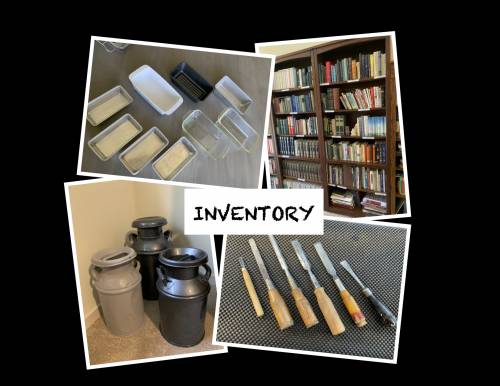Lazarus, Scrooge, and the Inventory Project
by Ken Rummer | Special to Presbyterian News Service
 What would it cost to buy it all back?
What would it cost to buy it all back?
Early in the pandemic, my wife and I undertook an inventory with the help of a computer program. We entered our possessions, room by room, with photos and a few facts. The process proved arduous, but we made it to the end.
More recently, preparing for an insurance review, we tackled adding a replacement value for each of our things. It wasn’t as bad as trying to hang wallpaper together, but it was in the neighborhood.
Item by item, the computer kept a running tab, and at the end it reported the total.
I always saw myself as a person of modest means — never competitive in the race with the Joneses. But when the computer finished adding up all the values we’d been entering, the number it spit out was a lot bigger than I expected.
I’m still wrestling with the dissonance.
Marie Kondo recommends starting the tidying process by pulling all your clothing out of drawers and bins and closets, and piling it on the bed. I’m looking at all my stuff piled into one computer file and then run through a checkout line. The total at the bottom of the ticket is overwhelming and a bit embarrassing.
Jesus taught about hearts hanging out with treasures (Luke 12:34). I wonder how much of my heart is tangled up with this pile of possessions. How much of my stuff am I dragging around like the chains and cash boxes shackled to Marley’s ghost?
One of the parables of Jesus in the Gospel of Luke compares the life experience and future destiny of two persons, one poor and one rich (Luke 16:19-31). The poor man’s name is Lazarus. The rich man isn’t given a name, but he has come to be called Dives (Dye-vees), the Latin word for “rich” that appears in the Vulgate translation of the story.
In this life, Dives has a lot of stuff. Lazarus has less than nothing. In the next life, their positions are reversed — a picture of the kingdom of God as Luke preaches it.
Pondering the big number at the bottom of our inventory report, I’m forced to face an uncomfortable truth: I have more in common with Dives than with Lazarus.
Luke’s Jesus story does hint at redemptive possibilities. If only Dives had noticed the suffering of Lazarus just outside his door. If only Dives had done something about it.
Charles Dickens explored these if-onlys in the closing pages of “A Christmas Carol” (1843). He wrote that, in the end, the rich but ghost-challenged Scrooge did notice and he did do something about it, raising the salary of his employee Bob Cratchit and assisting his struggling family, including Tiny Tim.
Finding myself on Dives’ side of the teeter-totter, I’m thinking I’d best keep an eye out for Lazarus and the Cratchits, and see what else I can do.
Ken Rummer is an honorably-retired teaching elder in the Presbyterian Church (U.S.A.).
![]() You may freely reuse and distribute this article in its entirety for non-commercial purposes in any medium. Please include author attribution, photography credits, and a link to the original article. This work is licensed under a Creative Commons Attribution-NonCommercial-NoDeratives 4.0 International License.
You may freely reuse and distribute this article in its entirety for non-commercial purposes in any medium. Please include author attribution, photography credits, and a link to the original article. This work is licensed under a Creative Commons Attribution-NonCommercial-NoDeratives 4.0 International License.
Categories: Presbyterians Today
Tags: inventory, lazarus, luke 16:19-31, possessions
Ministries: Presbyterians Today